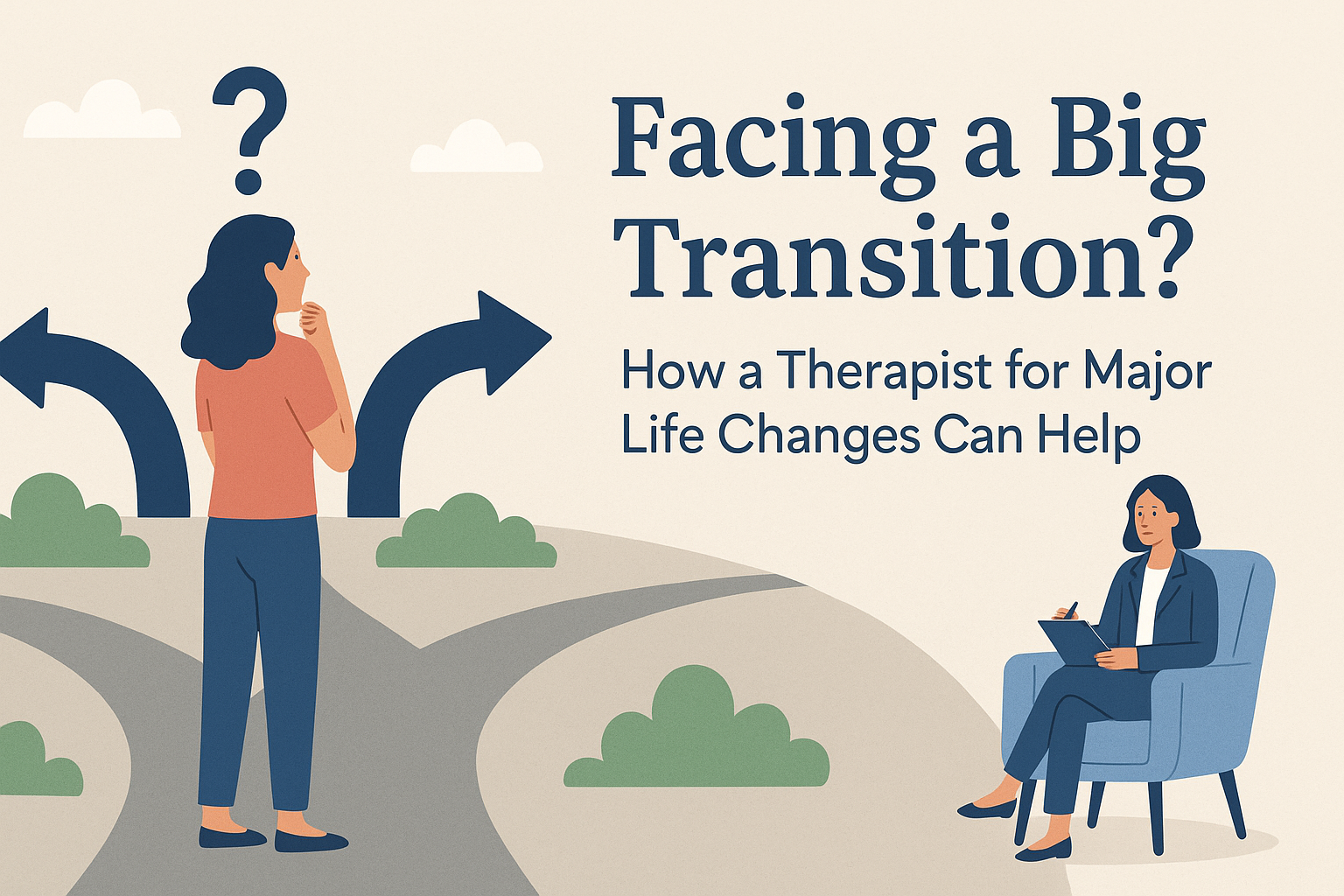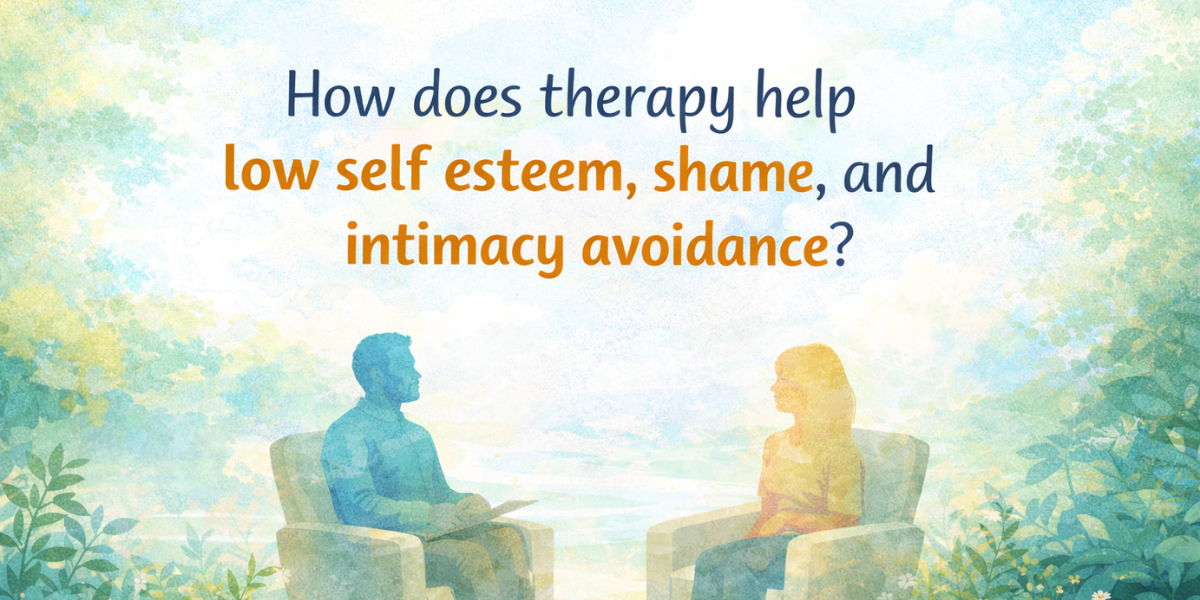Life has a way of surprising us.
Some moments bring joy—like starting a new job, moving to a dream city, or welcoming a baby.
Others come with heavy emotions—like divorce, losing a loved one, or facing retirement when you’re not ready.
These turning points can shake us to our core.
They can feel overwhelming, even when they’re supposed to be positive.
That’s where a therapist for major life changes comes in.
Think of them as a steady hand to hold when everything around you feels uncertain.
With guidance, you don’t just get through these shifts—you grow stronger because of them.
Why Transitions Feel So Overwhelming
Change is part of life. But that doesn’t mean it’s easy.
A transition forces us to let go of what’s familiar.
Even if the future looks bright, the unknown can stir up anxiety, doubt, and grief. You might notice yourself asking:
- Am I making the right choice?
- Why do I feel lost when everyone else thinks I should be happy?
- How do I move forward without falling apart?
These are normal questions.
But without the right support, they can spiral into stress, sleepless nights, or even depression. That’s why therapy becomes such a powerful tool.
What a Therapist for Major Life Changes Really Does
A therapist doesn’t magically erase challenges.
What they do is help you navigate them in healthier, more balanced ways.
Here are a few ways they guide you through transitions:
- They create a safe space.
- Sometimes, family and friends can’t fully understand what you’re going through. Or maybe you don’t feel comfortable being completely honest with them. A therapist listens without judgment. That alone can feel like a relief.
- They help you name your emotions.
- Change stirs up a mix of feelings—excitement, fear, sadness, even guilt. A therapist helps you sort through those emotions so you don’t get stuck in them.
- They teach coping strategies.
- From mindfulness exercises to practical planning tools, therapy equips you with ways to manage stress and build resilience.
- They guide you in finding meaning.
- Instead of seeing your transition as something to “get through,” therapy can help you see it as an opportunity for growth and self-discovery.
In other words, a therapist helps turn chaos into clarity.
Major Life Changes, Minimal Stress: The Role of Therapy in Tough Times
When big life shifts happen, the stress can feel unbearable.
But with the right therapist, you can face challenges with less fear and more confidence.
Let’s imagine two scenarios.
- Without therapy: You bottle up your feelings, try to “push through,” and end up exhausted, anxious, or angry. The stress piles up.
- With therapy: You have a safe outlet to talk. You develop healthy coping skills. You create a plan to move forward with purpose.
The difference is life-changing. Therapy doesn’t take away the difficulty, but it makes the weight easier to carry.
As one client once said, “My therapist didn’t solve my problems. But she gave me the tools to solve them myself.”
Examples of Transitions Where Therapy Can Help
Not all major life changes are the same, but therapy can support you through many of them:
- Career shifts: Starting a new job, getting laid off, or retiring can trigger identity questions. Therapy helps you redefine your sense of purpose.
- Relationship changes: Whether it’s a breakup, divorce, or marriage, your sense of stability changes. A therapist helps you process the emotions tied to these shifts.
- Parenthood: Becoming a parent is joyful but also overwhelming. Therapy provides a safe space to talk about fears and expectations.
- Grief and loss: Losing someone close can feel unbearable. A therapist gently helps you navigate mourning and healing.
- Relocation: Moving cities or countries can trigger loneliness. Therapy helps you adjust and rebuild your social connections.
Each transition comes with its own set of challenges.
The beauty of therapy is that it meets you exactly where you are.
The Benefits Go Beyond the Transition
One of the most overlooked gifts of working with a therapist during a big transition is that the benefits last long after the change is over.
- Resilience for the future: Once you learn coping tools, you can use them for any challenge ahead.
- Improved relationships: By understanding your emotions better, you communicate more effectively with others.
- Clarity of values: Therapy often helps you discover what truly matters to you, shaping healthier decisions in the long run.
As a result, you don’t just survive the transition—you come out of it wiser, stronger, and more grounded.
What to Expect in Your First Session
Walking into therapy for the first time can feel intimidating.
But knowing what to expect can ease those nerves.
During your first session, your therapist may:
- Ask about your background and the specific life change you’re facing.
- Explore how you’re currently coping and what feels hardest right now.
- Work with you to set goals—whether it’s reducing stress, gaining clarity, or finding healthier habits.
The focus is on you. It’s about creating a partnership where you feel heard, understood, and supported.
Therapy as a Tool for Self-Discovery
Transitions often force us to confront who we are without the roles we once held. For example:
- If you’ve always defined yourself by your career, who are you after retirement?
- If your identity was tied to being in a relationship, who are you after a breakup?
- If you’re moving to a new city, what version of yourself will emerge there?
These questions can feel unsettling.
But therapy turns them into opportunities.
It helps you peel back the layers and rediscover your authentic self.
As one therapist put it, “Change doesn’t just show you what you’ve lost. It shows you what you’re capable of becoming.”
How to Find the Right Therapist for Major Life Changes
Finding the right fit matters. Therapy works best when you feel comfortable with your therapist. Here are a few tips:
- Look for experience: Choose someone who specializes in transitions, grief, or stress management.
- Trust your gut: After a session or two, ask yourself, Do I feel safe opening up to this person?
- Ask about their approach: Some therapists use cognitive-behavioral tools, while others focus on mindfulness or narrative therapy. Find what feels right for you.
Remember, it’s okay to “shop around” until you find the right match.
A Gentle Reminder
If you’re standing at the edge of a big change and feel overwhelmed, you’re not alone.
Life transitions are hard, even when they’re exciting. Working with a therapist for major life changes doesn’t mean you’re weak.
It means you’re choosing support so you can face your new chapter with clarity and strength.
Sometimes the bravest thing you can do is ask for help.
Final Thoughts
Change is inevitable. Stress doesn’t have to be.
Therapy offers more than just a lifeline during transitions—it offers a map for the journey ahead.
It gives you tools, insights, and a safe space to grow.
And in the process, you discover that you’re stronger than you ever realized.
So if you’re facing a big transition right now, take heart.
The support you need is out there.
And with it, you can move through this season not just with survival, but with grace and resilience.
FAQs
What does a therapist for major life changes actually do?
A therapist helps you navigate big transitions—like divorce, career changes, or loss—by offering emotional support, teaching coping strategies, and helping you find clarity. They don’t tell you what to do, but they guide you in discovering the best path forward.
When should I consider seeing a therapist during a life transition?
If you’re feeling stuck, overwhelmed, or unsure how to cope with change, therapy can help. Signs might include constant stress, difficulty sleeping, mood swings, or feeling like no one truly understands what you’re going through.
Is therapy only for “negative” life changes?
Not at all. Even positive changes—like marriage, becoming a parent, or getting promoted—can bring stress and adjustment challenges. A therapist helps you manage the pressure and fully embrace new opportunities.
How does therapy reduce stress during major life changes?
Therapy gives you a safe space to process emotions, identify healthy coping tools, and create strategies for moving forward. This combination lowers stress and helps you feel more in control, even when life feels unpredictable.
What if I’ve never been to therapy before?
That’s completely okay. Your first session is simply a conversation where your therapist gets to know you and your current challenges. There’s no pressure—you set the pace, and the therapist supports you without judgment.
How long will I need therapy for a life change?
It depends. Some people find a few sessions are enough to gain clarity and coping tools. Others choose to continue for months as they adjust to their new reality. Your therapist will work with you to set goals that feel right for your situation.
Can therapy really make a difference in tough times?
Yes. While therapy doesn’t erase challenges, it changes how you respond to them. Many people find that with guidance, they experience “major life changes, minimal stress.” Therapy helps turn transitions into opportunities for growth instead of sources of fear.





